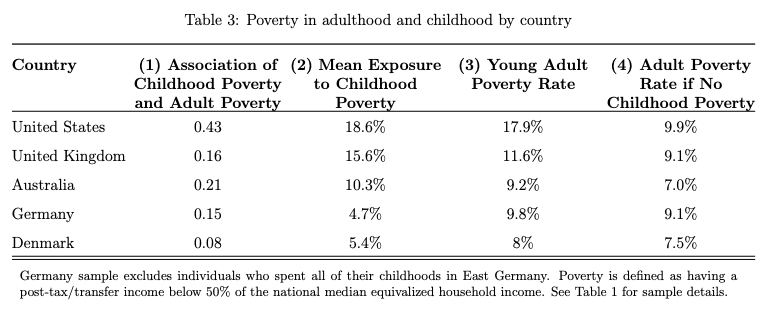Jacob Riis/Bettmann/Getty Images
- The American dream promises upward mobility.
- But a child born in poverty in America is more likely to face poverty in adulthood than in many Western countries.
- Academic researchers say a stronger social safety net could help.
The American Dream might look a little different for everyone. But at its heart, it promises upward mobility, the opportunity to attain success no matter what situation you might be born into.
Recent research shows that's more likely to happen in Denmark, Germany, Australia, and the UK.
In a recent paper titled The Intergenerational Persistence of Poverty in High-Income Countries, academics at Bocconi University and Rockwool Foundation and Stockholm University explored how poverty persists across generations in multiple countries.
Their finding: "Intergenerational poverty in the U.S. is four times stronger than in Denmark and Germany, and twice as strong as in Australia and the UK."

Bocconi University, Rockwool Foundation and Stockholm University
This table shows what the researchers call "intergenerational persistence of poverty" across five countries.
The researchers' measure of persistence of poverty in the US is 0.43, which means that "experiencing all of one's childhood in poverty is associated with a 43 percentage point higher mean poverty exposure during early adulthood (relative to an adult with no child poverty exposure)." In Denmark, in contrast, it's just 0.08.
That is, while an American child who grows up in poverty is much more likely to be in poverty in adulthood, a Danish child who grows up in poverty is only slightly more likely to be in poverty in their young adult years.
The researchers found this difference between countries has little to do with differences in quality of education, nor is it based on racial discrimination or location, with the persistence of poverty in the US high across racial and geographic lines.
Instead, the researchers find that the persistence of poverty is strongly connected to tax rates and what they call transfer insurance effects, which can be considered as akin to a social safety net.
"The U.S. is the archetype of a liberal and residualist welfare state, featuring stratified access to higher education and employment, strong earnings returns to higher education, and a comparatively weak welfare state to insure against risks in adulthood," the researchers said.
Even more meaningful in the US is what the researchers call a "residual poverty penalty," or the scars that a childhood in poverty can leave on an individual. The researchers found that "exposure to childhood poverty is particularly severe in the US," citing for example less access to quality healthcare among low-income US residents.
This latest research echoes many other similar findings. Back in 2017 for example, my former colleague Pedro Nicolaci da Costa wrote that the UK, Canada, and Denmark all offered a greater chance of social mobility than the US.
More recently, research published by the Federal Reserve Bank of Chicago found that the US has relatively low rates of intergenerational income mobility compared with other advanced economies, and that this mobility has been declining over the past forty years.
So yes, you're more likely to experience the American Dream in many countries outside the US.
Read More
By: [email protected] (Matt Turner)
Title: You're more likely to live the American dream in Germany, Denmark, or Australia
Sourced From: www.businessinsider.com/american-dream-social-economic-mobility-more-likely-germany-denmark-australia-2023-6
Published Date: Thu, 22 Jun 2023 10:00:00 +0000
.png)





